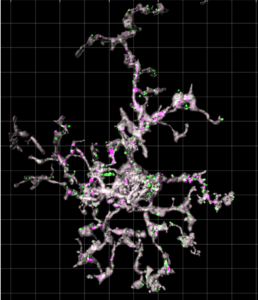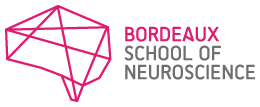For over a century, the main focus of neuroscience research has been on neurons. It is however, becoming ever more clear that brain functions such as conceptual reasoning, memory, and processing speed depend on glial cells (microglia, astrocytes and oligodendrocytes).
The lack of understanding of the role of glia in normal brain development, function and disease is mainly due to lack of tools and methods to accurately study these cells. In recent years, neuroscience has seen a methodological revolution. The function of glia cells in neuronal circuit development, and neurodegenerative disease has become evident. The study of glial biology and the understanding on how glial cells impact on circuit function are key to understanding how the brain works and what goes wrong in brain disease. Advanced training of a new generation of neuroscientists with strong focus on glial function is crucial to make these studies a success in the coming decades.
Course director & co-directors
- Ragnhildur Thora Karadottir (Cambridge University, UK)
- Cagla Eroglu (Duke University, USA)
- Staci Bilbo (Duke University, USA)
- Jean-Christophe Delpech (Bordeaux University, France)
June 19 – 11:00am Course directors talk
Ragnhildur Thóra Káradóttir (Cambridge University, UK)
Cagla Eroglu (Duke University, USA)
Staci Bilbo (Duke University, USA)
Jean-Christophe Delpech (INRAE Bordeaux University, France)
June 22 – 9:00am Wiebke Moebius (Max-Planck Institute of Multidisciplinary Sciences, Germany)
Exploring myelin biology with electron microscopy.
June 22 – 10:00am 3 Brain : Presentation
June 22 – 11:00am Amit Agarwal (Heidelberg University, Germany)
Decoding calcium signals and mitochondrial dynamics in brain macroglia in vivo.
June 23 – 9:00am Thomas Papouin (Washington University, School of Medicine , USA)
Mapping the Contribution of Astrocytes to the Effects of Neuromodulators on Synapses and Behavior.
June 23 – 11:00am (Virtual talk) Mikael Simons (DZNE, Germany)
Mechanisms of (re)myelination in the CNS.
June 24 – 9:00am Caroline Smith (Boston College, USA)
Conducting rigorous behavioral testing in the context of neuro-immune interactions.
June 24 – 10:00am Giampaolo Milior (College de France, France)
Glial cells in the human brain: new insights and perspectives from work on human epileptic tissues.
June 26 – 9:00am Kelly Monk (Vollume Institute, USA)
Molecular and genetic analysis of glial cell development.
June 26 – 11:00am Maarten Kole (Netherlands Institute for Neuroscience , The Netherlands)
Neuron-oligodendrocyte interactions in cortical circuits.
June 29 – 9:00am Addgene Presentation
Addgene’s resources for neuroscience.
June 29 – 9:45am Zeiss Presentation
June 29 – 5:45pm (Virtual talk) David Rowitch (Cambridge University, UK)
Heterogenous origins of glia.
June 30 – 9:00am Stephane Oliet (Neurocentre Magendie, Bordeaux University, France)
Astroglial contribution to NMDA receptor activity.
June 30 – 11:00am Nathalie Rouach (Collège de France, France)
Astrocytes : the stars of brain plasticity.
July 1 – 9:00am Bart Eggen (UMCG/RUG, The Netherlands)
Human microglia in development, health and disease.
July 3 – 9:00am Sonia Garel (PSL University, France)
Microglia in early brain wiring: from circuit assembly to tissue integrity
July 3 – 11:00am Eric Boué-Grabot (Bordeaux University, France)
Synaptic and microglial function of ATP P2X receptors in health and disease
July 3 – 5:30pm (Virtual talk) Paola Arlotta (Harvard University, USA)
Changing neurons to shape glia: a tale of microglia and oligodendrocytes
July 6 – 9:00am Soyon Hong (Dementia Research Institute, University College London, UK)
Microglia-synapse interactions: The triggers and the consequences.
July 6 – 2:30pm David Belin (Cambridge Univeristy, UK)
Role of striatal astrocytes in the development of drug seeking habits
July 6 – 4:00pm TDT Presentation
Amit Agarwal – Heidelberg University, Germany
Liam Barry–Carroll – IMN, University of Bordeaux, France
Arne Battefeld – IMN, University of Bordeaux, France
Felipe Bodaleo – Heidelberg University, Germany
Sarah Bou Sader Nehme – IMN, University of Bordeaux, France
Sara Carraedo Vicente – IMN, University of Bordeaux, France
Omar De Faria – Stem Cell Institute, University of Cambridge, UK
Mohit Dubey – Netherlands Institute for Neuroscience, The Netherlands
Jiaxing Li – Oregon Health & Science University, US
Charlotte Madore-Delpech – INRAE, University of Bordeaux, France
Giampaolo Milior – College de France, France
Wiebke Möbius – Max Planck Institute for Multidisciplinary Sciences, Germany
Torben Ruhwedel – Max Planck Institute for Multidisciplinary Sciences, Germany
Kristina Sakers Hays – Duke University Medical Center, US
Caroline Smith – Duke University, US
Francesco Ulloa Severino – Duke University, US
This is a theoretical and practical training course on glial cells and their communication with neuronal circuits. It will provide an overview of the current concepts and knowledge of glial cell biology in central and peripheral nervous system development in several species, including zebrafish, mice, and humans, and their link to diseases.
It will combine lectures and hands-on projects on glial development including methods in cellular neuroscience (e.g. live and fixed tissue imaging), genetic modifications, -omics (e.g., scRNA seq, proteomics and bioinformatics), electrophysiology, optogenetic and chemogenetic manipulation of glial cells and methods to study behaviour.
OUR SPONSORS





Keynote Speakers
Amit Agarwal – Heidelberg University, Germany
Paola Arlotta – Harvard University, US
David Belin – University of Cambridge, UK
Bart J. L. Eggen – University Medical Center Groningen, The Netherlands
Sonia Garel – Institut de Biologie de l’Ecole Normale Superieure (IBENS), Paris, France
Soyon Hong – UCL, London, UK
Maarten Kole – Utrecht University, The Netherlands
Kelly Monk – The Vollum Institute, OHSU, US
Stéphane Oliet – Neurocentre Magendie, France
Thomas Papouin – Washington University School of Medicine in St. Louis, US
Nathalie Rouach – College de France, France
David Rowitch – University of Cambridge, UK
Mikael Simons – Technical University Munich, Germany
